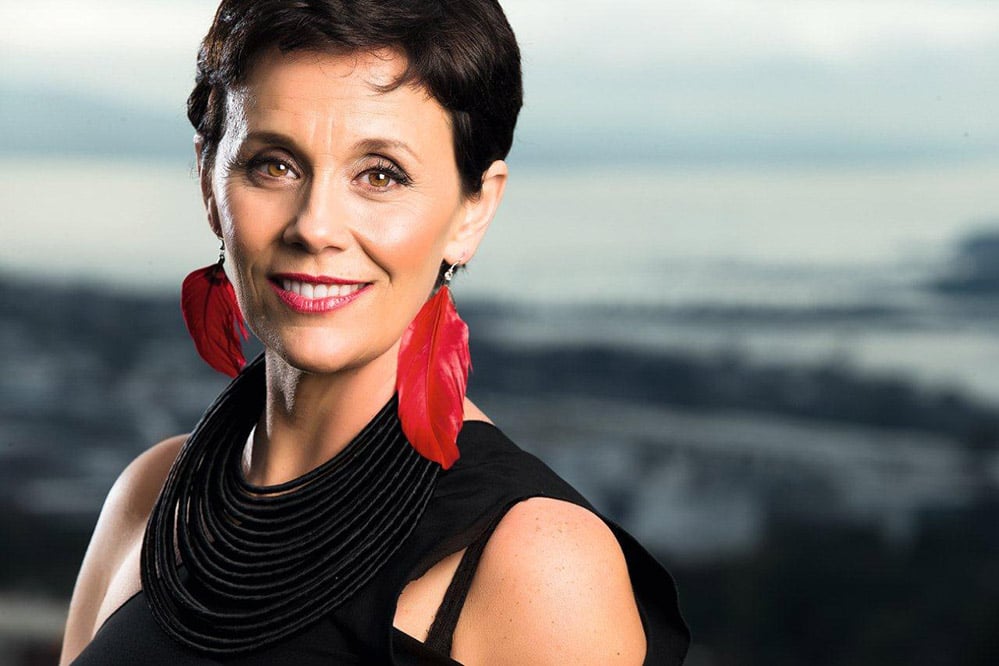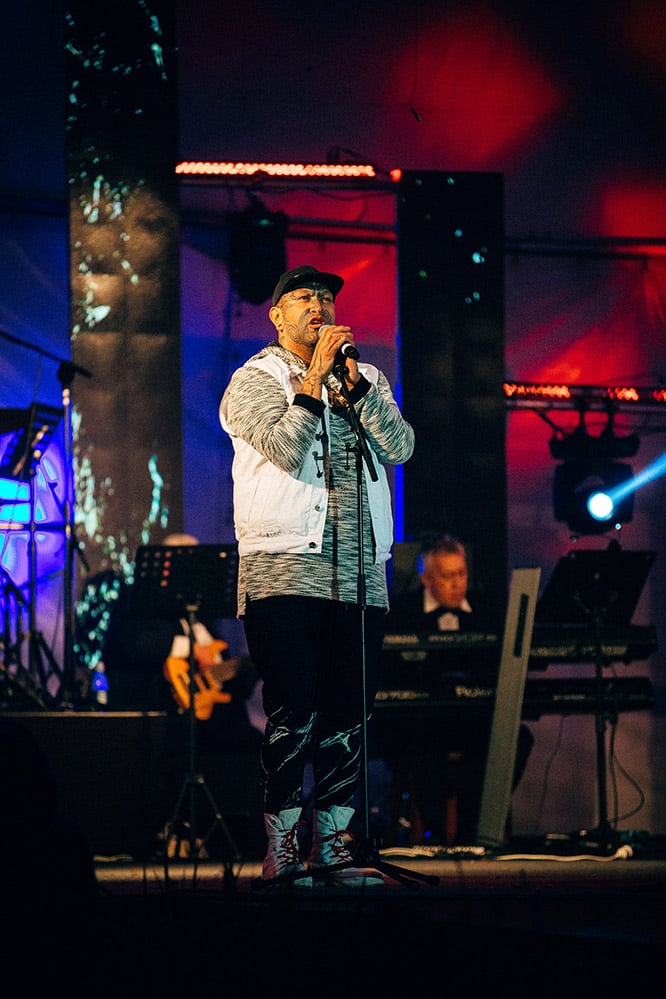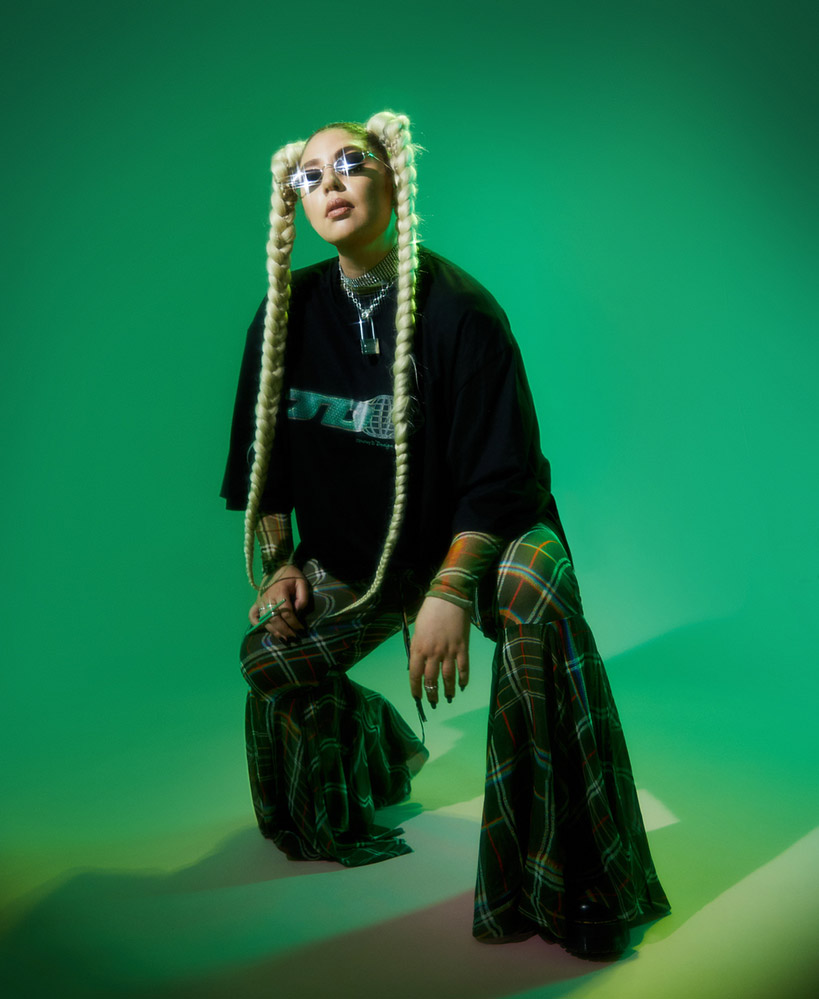Shyam Patel
The hard-won future of New Zealand’s native language is in good hands, and music is at the forefront.
When I was a little girl growing up in New Zealand, my aunty would sometimes pick me up from primary school. She would open her arms wide as I sprinted toward her and she’d half sing, ‘Haere mai, Haere mai!’ and give me a big unrestrained hug. I only found out later, when I asked my father, that she was saying: ‘Come here! Welcome!’
My father was one of eight children who grew up in a home where it was forbidden to speak te reo Māori; this was the command of my grandfather. My father’s connection to his Ngāpuhi tribe was never encouraged. His mother, daughter of Kauri gum digger and Northland’s first midwife Ngakina Hoana Waitai, only started speaking te reo again when my grandfather died. For my father, being lighter skinned than some of his siblings opened doors, both figuratively and literally. As a child he was allowed inside the house down the street that had the colour TV, while my aunty and some of his other siblings were never able to cross the threshold.
In August 1987, three months after I was born, te reo Māori was made an official language through the passing of the Māori Language Act. The language had once been regarded by some as an ancient vestige of Māori life; it was attacked with the Tohunga Suppression Act of 1907, which prohibited Māori from speaking their own language, wearing tā moko (tattoo art) and practising their culture.
When Hinewehi Mohi, singer-songwriter and founder of the Raukatauri Music Therapy Centre, made headlines in 1999, it wasn’t for reasons she might have hoped for. She was in London promoting Oceania—the first contemporary album written and recorded in te reo Māori to be released worldwide—when she was asked to perform the New Zealand national anthem at that year’s Rugby World Cup quarter final in Twickenham. The controversy? She sang “E Ihowā Atua”, not “God Defend New Zealand”.
The backlash was immediate. Some New Zealanders were angry and many weren’t shy about voicing their strong opinions on talk back radio or through a flurry of faxes to local news networks. In an interview with Paul Holmes, well-known host of his eponymous primetime current affairs TV show, he asked her pointedly, “Whose idea was it?” Mohi was forced to defend her decision. “I just felt it was a natural thing to do,” she responded.
During her rehearsal at the game, she was asked to sing the English version as well, but Mohi didn’t know all the words to the English verse. She chose the route that felt most instinctive and decided to sing in her ancestral tongue.
“I was really confident in what I was going to do in Māori and I felt it would be beautiful,” Mohi tells Rolling Stone. “People really expected that the haka was performed in Māori,” she rationalises. “There wasn’t any English version of the haka.”
Love Music?
Get your daily dose of everything happening in Australian/New Zealand music and globally.
Mohi was swiftly made aware that at that time, 121 years after the Māori verse of the anthem was printed in an Otago newspaper, you simply could not sing the national anthem in New Zealand’s native language without it being viewed as a political act.

Hinewehi Mohi sparked a small revolution when she performed at the 1999 Rugby World Cup. (Photograph by David White)
Without realising it at the time, by celebrating her identity, Hinewehi Mohi sparked a small revolution. New Zealand elected Helen Clark as Prime Minister the following month in late November and in the early 2000s she passed down a directive to proclaim that, moving forward, the national anthem would be sung in both English and Māori at all important national events.
Long before Hinewehi Mohi set in motion a place of pride for te reo at every important occasion, generations before her were reprimanded for even speaking the language in institutional spaces. Mohi’s grandparents spoke Māori at home, but if they were caught speaking it at school they had their mouths washed out with soap.
“What they were saying is my language, te reo Māori, is dirty and so we don’t want you speaking that language.” – Hinewehi Mohi
“What they were saying is my language, te reo Māori, is dirty and so we don’t want you speaking that language,” notes Mohi. “When they had children, they didn’t want to pass that on either, because it meant that they were setting them up to be discriminated against.”
Political activism has been the driving force in nearly every historic chronicle of a language stolen and brought back to life, from New Zealand’s founding document The Treaty of Waitangi in 1840 – between the British Crown and about 540 Māori rangatira (chiefs) – to the decision in March this year by the New Zealand Broadcasting Standards Authority to no longer engage with complaints about the use of te reo across broadcast media.
More than seven billion people on Earth go about their days using one or a few of just over 7,100 languages. However, while multilingualism is prominent, 40% of those languages are now endangered. Calculations from the Catalogue of Endangered Languages show that if the historical rate of loss is averaged, a language dies about every four months. Meanwhile, linguists at authoritative resource Ethnologue predict that by the end of this century as many as 50% of the world’s languages will exist only in archives.
Since that cold British October day at the Rugby World Cup when the All Blacks beat England in 1999, Hinewehi Mohi has made it her life’s work to keep te reo at the forefront of New Zealand’s collective mind. In 2018, Mohi cornered Universal Music New Zealand Chairman Adam Holt on her way to the bathroom and gave him an elevator pitch.
The following year Waiata / Anthems was released, a compilation album recorded entirely in te reo featuring some of New Zealand’s biggest acts re-recording their biggest hits. Funded by Creative New Zealand, and with the help of Mohi and Māori language academic Sir Tīmoti Kāretu, acts like BENEE, Bic Runga, Drax Project, and Six60 were guided into reimagining their songs and embracing New Zealand’s ancestral tongue.
Waiata / Anthems went on to take the number one spot on the NZ albums chart a week after its release. It made history as the first album recorded entirely in Māori to do so, even beating out global chart-topper Post Malone.
“I didn’t realise it was a big deal because I didn’t know who Post Malone was,” laughs Mohi. “[…] It was just such an incredible response and reminded me how powerful music is and how incredible it is in connecting people, and providing access for people to the language and the culture to participate, and really feel like it’s a part of them.”
Six60 went on to perform their Māori version of “Don’t Forget Your Roots”, “Kia Mau Ki Tō Ūkaipō” around Europe and Australia in 2019. Meanwhile, the Waiata / Anthems experience inspired Wellington band Drax Project to record another single entirely in te reo. The hitmakers behind “Woke Up Late” released “Tukituki Te Manawa” as a Christmas single last December, enlisting the help of Mohi and Sir Tīmoti Kāretu once again, along with Grammy award-winning musician and Māori musical instrument specialist Puoro Jerome.
“The whole process of doing both of the songs just really triggered something in us,” says Drax Project’s drummer Matt Beachen. “It sparked a bit more interest and I hope that hearing the songs for other people who listen to them, it does something similar.”
When Drax Project took to the stage at Sky Stadium in February they performed “Tukituki Te Manawa” and a fusion of both “Woke Up Late” and its te reo counterpart “I Moeroa”.
“You hear the big cheer every time,” says Drax Project’s bassist Sam Thomson of the band including this version in their touring set. “We do the first three quarters of the song in English and then come out into the big triumphant climatic chorus, after the bridge, in te reo. And there’s a big cheer every time. That’s always been a special part of the set.”
“We do the first three quarters of the song in English and then come out into the big triumphant climatic chorus, after the bridge, in te reo. And there’s a big cheer every time. That’s always been a special part of the set.” – Drax Project’s Sam Thomson
Realistically, it should come as no surprise that a song or album recorded in a peripheral language can not only coexist with what some call “bully” languages of colonialism, but that they can also enjoy huge popular success among music fans. You don’t need to understand every word someone is singing to appreciate the beauty of their lyrics.
You only need a glance at the Billboard Hot 100 each week to see how music fans can latch onto tracks in languages other than their own. Colombian reggaeton artist J Balvin, Puerto Rican singer Luis Fonsi, and Spanish pop artist Rosalía have all enjoyed global success, even in markets with traditionally few Spanish speakers. K-pop group BTS have had 20 non-English language songs chart in the Billboard Top 10.
There is more than enough proof that te reo can appeal to an engaged global audience; we need only look at some of New Zealand’s most proud exports. Multi-award winning musician Rob Ruha grew up in the world of kapa haka, which is the term for Māori performing arts and literally means to form a line (kapa) and dance (haka). The combination of singing and dancing covers an array of genres and is performed as a way to celebrate, intimidate or even mourn, depending on the occasion where it’s performed.
“It’s like a freight train of sound and energy, moving in one direction, and at one time, at full speed,” says Ruha from his home on New Zealand’s east coast, Te Kaha.
Ruha’s entire family speak te reo Māori as a first language. He lives in a community that predominantly speaks te reo Māori and he clocks millions of streams on Spotify for his singles like “Kalega” and “Ka Mānu”. Ruha speaks in a quietly hypnotic voice as he tells me about the commercial mainstream spaces in which te reo is now occupying. In 2017 he finished his role as Musical Director on the te reo Māori version of Disney hit Moana. Currently, he’s working with a game content creator and Maui Studios on an anime project about his ancestor Paikea, the Whale Rider.
“We have a proud tradition here in Aotearoa, definitely in te reo Māori, that history is preserved in song. Events are preserved in song. Language is preserved in song,” he says.
“We have a proud tradition here in Aotearoa, definitely in te reo Māori, that history is preserved in song. Events are preserved in song. Language is preserved in song.” – Rob Ruha
Listening to Rob Ruha’s music without understanding te reo is a heart-opener. He sings of institutional racism, legislation against language, prohibition against language, and Māori cultural practices, but it’s all wrapped up in a warm embrace where these issues are presented as a dialogue, not an attack.
“I was really lucky six years ago to step into an environment that was ready,” Ruha says. “That was ready to accept a deeper dive into our culture. That was ready to accept an unapologetic presentation of who we are as people. And my music is predominantly in te reo Māori, but it talks about some really hard-hitting subjects.”
Those hard-hitting topics have been understood across the globe, even by non-Māori speakers. In 2015, Ruha performed in te reo at the Celtic Connections Festival in Scotland with Maisey Rika, Seth Haapu, Mahuia Bridgeman-Cooper, and JJ Rika.

Rob Ruha at Tūrangawaewae Marae in Waikato for the tenth coronation celebration of Māori King Kiingi Tūheitia (2016). (Photograph by Erica Sinclair)
“No one spoke Māori but they laughed on cue, they cried on cue and they were contemplative on cue,” says Ruha. “We sang predominantly – and when I say predominantly it was probably 95% – in te reo Māori.
“We introduced the songs mostly in te reo Māori, and they got it,” he adds. “That’s because music allows you to disconnect from the baggage that you hold, from intellectual engagement and then really listen to the music through your heart, through your spirit.”
“No one spoke Maori but they laughed on cue, they cried on cue and they were contemplative on cue.” – Rob Ruha
When Ruha mentions he once performed in Chile to a crowd of 10,000, he chuckles. “Man they’ve got swag when they dance in a crowd. And to see 10,000 people doing salsa moves in the crowd to a te reo Māori song about kumara (sweet potato). It’s amazing.”
Another artist championing te reo Māori is Em-Haley Walker, a Christchurch-born artist who pays tribute to her whakapapa (genealogy) across two music projects, Theia and TE KAAHU. As a fluent speaker of te reo, Walker writes songs in both English and te reo, weaving a few Māori lyrics into her Theia project (e.g. “Creep”) and keeping TE KAAHU entirely in te reo. When she’s not writing, recording and performing, she teaches tikanga (customary practices) and basic te reo skills to others.
“The absence of te reo means the absence of our culture,” says Walker, pointedly.
“The absence of te reo means the absence of our culture.” – Em-Haley Walker
Walker’s culture is being felt and enjoyed in places where the language is barely heard. Her Christmas single through Māori language project TE KAAHU, “Te Kaiwhakaora O Te Ao”, received 250 Shazams in Switzerland in two weeks.
The Māori hymn was created to pay tribute to her late grandmother Rangirara, and yet it’s something that moved people to seek out its creator. Interestingly, woven through many of my conversations for this piece wasn’t a feeling of surprise at the global uptake of te reo music, but more a knowing shrug, as if to say, ‘of course it resonates’.
“I cannot think of a better way to get our reo across than in music,” says Walker. “Because music is the one thing that binds everyone together. More so than other mediums. It’s one thing that transcends generations as well.”
“I cannot think of a better way to get our reo across than in music.” – Em-Haley Walker
“When you give us our language and allow us to use it, then we’re more in touch with our emotions,” she adds. “It’s healthier. Even our haka, haka is always shown as a war dance which pisses me off. It’s not a war dance. It’s literally a way of composing really, really strong emotions.
“You can have haka when you’re sad or haka for when you’re happy. You know, we perform haka at 21st [birthday parties]. We perform haka at tangi (funerals). We perform haka at weddings you know, so it can be any emotion.”
For Walker, the intergenerational trauma she has experienced and witnessed has been caused, in part, by her current access to her culture. It’s a tragedy that has been perpetuated all over: first they take their land, then the First Nations’ voice, then the culture.
“We’ve had to take advantage of the Pākehā (white New Zealander) system that suppressed us for so long, to try and find a way to bring back our language, our culture, and everything that’s been lost,” says Walker. “That does unfortunately mean having to go to Pākehā or white institutions for that. For our own people.
“It’s a great source of hurt,” she adds. “Colonisation has meant we’ve been robbed of our culture and oppressed. Then we have to go back to those Pākehā institutions or ways of learning, which aren’t the same as our traditional Māori ways of learning.”
Impressively though, one of Walker’s big desires is for all people to “understand and fall in love and respect our people”. “I think the first way to do that is by understanding the complexities and the beauty of our language,” she says.
Walker’s single “Creep”, which she performed at Auckland’s Big Gay Out in February, is a battering ram mix of biting indie house and bass-heavy hip-hop. Featuring a te reo Māori pre-chorus and a powerful passion-fuelled haka at the bridge, it’s about sexual abuse and the trauma that follows it. Recalling the last time she performed “Creep” live, Walker says, “They’re so passionate about it. When you see that, there is no way that anyone can ever say that there’s no market for this […] I don’t know if any other artform could necessarily conjure that kind of emotion.”
In the same way that a purely instrumental song can bring you to tears, the sheer emotion that is portrayed through Māori language, an inherently poetic language, knows no bounds. Walker describes this perfectly when she speaks of her first love, who would converse with her in te reo.
“He would say things like, ‘Kei te pirangi koe ki te ruku hōhonu ki te puna aroha i taku taha?’. Which is, ‘Would you care to dive into the depths of the spring of love at my side?’.”
Walker says that what he meant, if they were speaking English, was, ‘Do you want to go out?’.

Hēmi Kelly Māori language lecturer. (Photograph courtesy of the Auckland University of Technology)
Hēmi Kelly is a full-time lecturer in te reo Māori at the Auckland University of Technology. He didn’t grow up speaking it but a strong affinity with the language and culture has meant he has devoted his career to contributing to the government’s target of one million speakers of basic te reo by 2040. The last survey on the Health of the Māori Language (2006) found that 23.7% of Māori are able to hold a basic conversation – that’s around 131,600 people.
Kelly has noticed a growing number of students enrolling in his course at AUT every year. “Finally, the general public are starting to embrace and see the value in the language and the culture,” he says.
“[…] It’s no longer something you hear only on the Marae (meeting place) or amongst a certain group of people,” Kelly adds. “You’re going to hear it on the radio, you’re going to hear it on the TV. It’s a part of who we are as New Zealanders, as people from Aotearoa.”
“You’re going to hear it on the radio, you’re going to hear it on the TV. It’s a part of who we are as New Zealanders, as people from Aotearoa.” – Hēmi Kelly
In a TEDx talk he conducted in 2019, Kelly said one wave of pushback the language has faced was due to the unfound thought that it would inhibit New Zealand’s economic value.
“I think this completely overlooks the fact that a great deal of our international appeal lies in our Indigenous language and culture,” he said.
Kelly notes that Māori businesses have a collective economic value of close to $50bn. More than that, research shows that one value of key competency for those businesses is knowledge of te reo Māori.
When asked about the impact music has on pushing te reo to the forefront, he says one of the best examples of that impact is kapa haka. “The [kapa haka] competitions are huge. The school competitions, the regional adult competitions, and then the national competition. You get 20,000 people at the national competitions going to watch, and 44 groups going to perform. We even have groups from Australia coming over, because there’s so many Māori in Australia.”
Much like many First Nations languages, te reo wasn’t a written language. Stories were told and passed down through waiata (song) and haka (dance).
“They still are today,” quips Kelly. “It’s such a strong part of our culture. You look at all the things that we have lost over time and then you look at how strong waiata and haka is.
“[…] Music is always that easy way in to embrace the language and culture and also feel proud about it as well. There’s camaraderie when you sing together.”

Em-Haley Walker pays tribute to her whakapapa (genealogy) across two music projects, Theia and TE KAAHU. (Photograph by Frances Carter)
Perhaps it’s the small population (just 4.9 million at the last census), or perhaps it’s a true testament to its resilient cultural heritage, but the Māori people who I spoke to for this piece had an open-minded view of non-Māori artists performing and recording music in te reo. Whether it’s Benee or Shaan, Matt and Ben from Drax Project for Waiata / Anthems, or even the idea of a Pākehā integrating the language into a musical work, they truly welcomed the idea. On one condition: it was done with integrity.
“When people start to create or start to use the language in their business, there needs to be some sort of partnership and advice in terms of doing it the right way,” says Hēmi Kelly. “When it’s done right, it’s welcomed. New Zealand’s a small country, you’ve just got to ask around or send a couple of emails.”
Rob Ruha asks anyone working in the space just one thing: “Move with integrity, engage with integrity and release with integrity. That’s all that we ask.”
“Move with integrity, engage with integrity and release with integrity. That’s all that we ask.” – Rob Ruha
It has taken fierce determination, resilience and unwavering belief in the importance of teo reo Māori as a pivotal part of New Zealand’s cultural identity to get to where we are today. The language represents not only an important part of the past, but a key component of the future; the New Zealand government has set a target of one million speakers of basic te reo by the year 2040, and the music industry will have an important role to play in achieving this laudable goal. Artists of all nationalities are encouraged to re-record their music in te reo or join artists like Rob Ruha and Em-Haley Walker in recording new tracks entirely in Māori.
“Whatever language you sing in, it will be embraced,” says Ruha. “Because when you sing from a beautiful place, you sing from a place of heart and you want to share. So, it’s no wonder that’s getting reflected now in commercial spaces, in streams, in number ones, in charts. Because, we can.”





































